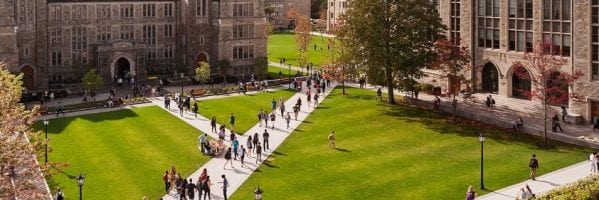MIT Faculty Director Explains Wave of “Alt” Jobs – Boston News

Let’s explore some of the most interesting stories that have emerged from Boston business schools this week.
How Transportation Disruption and Electric Vehicles Can Slash Greenhouse Gases – Questrom School of Business Blog
BU Questrom Professor of the Practice and Director of the university Institute for Sustainable Energy (ISE)’s Peter Fox-Penner and Research Fellow Jennifer Hatch recently co-authored new research with UC Berkeley’s Will Gorman, which illuminates how the car sharing, electric car, and autonomous vehicle trends could “lead to massive reductions in greenhouse gas emissions—without overtaxing the electric utility grid.”
Hatch explains, “Transportation emissions are 26 percent of the total emissions in the United States. We need to look at realistic ways to reduce those numbers. To significantly reduce greenhouse gas emissions, we know what we need to do: electrify the transport sector and decarbonize the electricity grid.”
You can find the group’s complete study on Science Direct.
Alt-Labor, Explained – MIT Sloan Newsroom
MIT Sloan Professor and Good Companies, Good Jobs initiative Faculty Director Thomas Kochan recently unpacked what he calls the emerging “alt-labor” movement.
“Traditional forms of union representation have declined to the point where advocates inside and outside the labor movement are searching for new strategies that work with today’s economy and workforce. Most of these new forms are working outside of what is considered traditional collective bargaining.”
Kochan adds, “Management had better start to listen to the workforce. And it better recognize that if it doesn’t start to look at more sensible forms of labor law, of labor policy, then it will be in a reactive position when the public does finally stand up and say enough is enough.”
You can read more about Kochan’s work here.
Restaurateur Partners with University to Battle Food Insecurity – Sawyer Business Blog
The Suffolk University Sawyer Business School recently profiled the CARES Pantry, a new initiative developed to address food insecurity on campus and give students access to healthier lifestyles.
Gene Lee, EMBA (’96), President and Chief Executive Officer of Darden Restaurants, who funded the initiative, says, “The goal is for every student in this University to be properly nourished, in and out of class, at work, and in their everyday lives.”

Gene Lee (’96) appearing at a recent event at Suffolk University / Photo via suffolk.edu
“It’s hard enough to be a good student in a competitive environment without having to worry about your next meal. The pantry will provide students with a safety net and a place they can count on and that they deserve.”
You can read more about Lee’s appearance at his alma-mater and the CARES Pantry here.
Impulses, a Culinary EMBA, and Immigration Figures – Boston News

Let’s explore some of the most interesting stories that have emerged from Boston business schools this week.
How God Influences Your Grocery Bill – Questrom School of Business Blog
BU Questrom Professor of Marketing Didem Kurt recently co-authored new research with the University of Pittsburgh’s J. Jeffrey Inman and Harvard’s Francesca Gino that explored links between “grocery sales data and rates of religious adherence in thousands of counties across the country.”
According to the study, “religion and religious messages were linked to lower spending.”
People who were reminded of God’s presence were less likely than another control group to spend money on “impulse purchases such as magazines and gum,” an effect that the researchers note “persisted whether or not an individual described themselves as religious.”
Kurt explains, “We attribute this result to the notion that thinking about God reminds people of commonly shared values—such as frugality—even if they don’t believe in God. Managers may want to consider proximity to houses of worship when choosing a retail location. They need to be cognizant of the effect of religious cues and reminders on consumer spending.”
You can read the full article here and check out the complete paper on Science Direct.
A Full-Course Meal – Sawyer Business School Blog
The Sawyer Business School Blog recently profiled David Lanci, EMBA ’02, who after many years as a chef, shifted into the food services industry and founded NexDine, which offers “catering and dining services to corporations, schools, colleges, and senior living facilities around the country.”
Lanci told the Sawyer blog that his Suffolk EMBA “gave [him] the confidence to go out and start this company. One thing I really learned from my EMBA is to take a holistic view of everything and never have a singular view. It’s not just about what’s on the plate.”

NexDine founder David Lanci, EMBA ’02
Lanci continues:
“I realized that how you communicate with the people in the group has a dramatic impact on the outcome. I realized it wasn’t just out of sheer will you could get something done. You had to collaborate, and that was the aha moment for me.”
He concludes, “Food is almost the easy part. It’s just as challenging—if not more so—to manage people, manage clients, manage budgets. And in our industry, we’re not making widgets. We can’t do everything the same way for every client. Every location is different. People’s appetites are different.”
You can read the full interview with Lanci here.
Undocumented Immigrant Population Roughly Double Current Estimate – MIT Sloan Newsroom
According to new research from MIT Sloan’s Mohammad Fazel-Zarandi and Yale’s Edward Kaplan and Jonathan Feinstein, “the number of undocumented immigrants living in the country is about 22.1 million, nearly twice the most prominent current estimate of 11.3 million.”
Fazel-Zarandi explains, “It’s likely that undocumented immigrants are more difficult to locate and survey than other foreign-born residents and if contacted, they may be inclined to misreport their country of origin, citizenship, and number of household residents, fearing the legal consequences of revealing their status.”
He continues:
“A common argument in favor of a tougher immigration policy is that people who have entered the country illegally elevate levels of violent criminal activity.”
“Whatever the extent of criminality that is assessed, it’s clear that crime statistics be thought of in relation to a substantially larger population of undocumented immigrants. This lessens the risk in per capita terms. What’s acceptable for a population of 11 million is unlikely to be sufficient for a population of 22 million.”
You can read the full article here.
